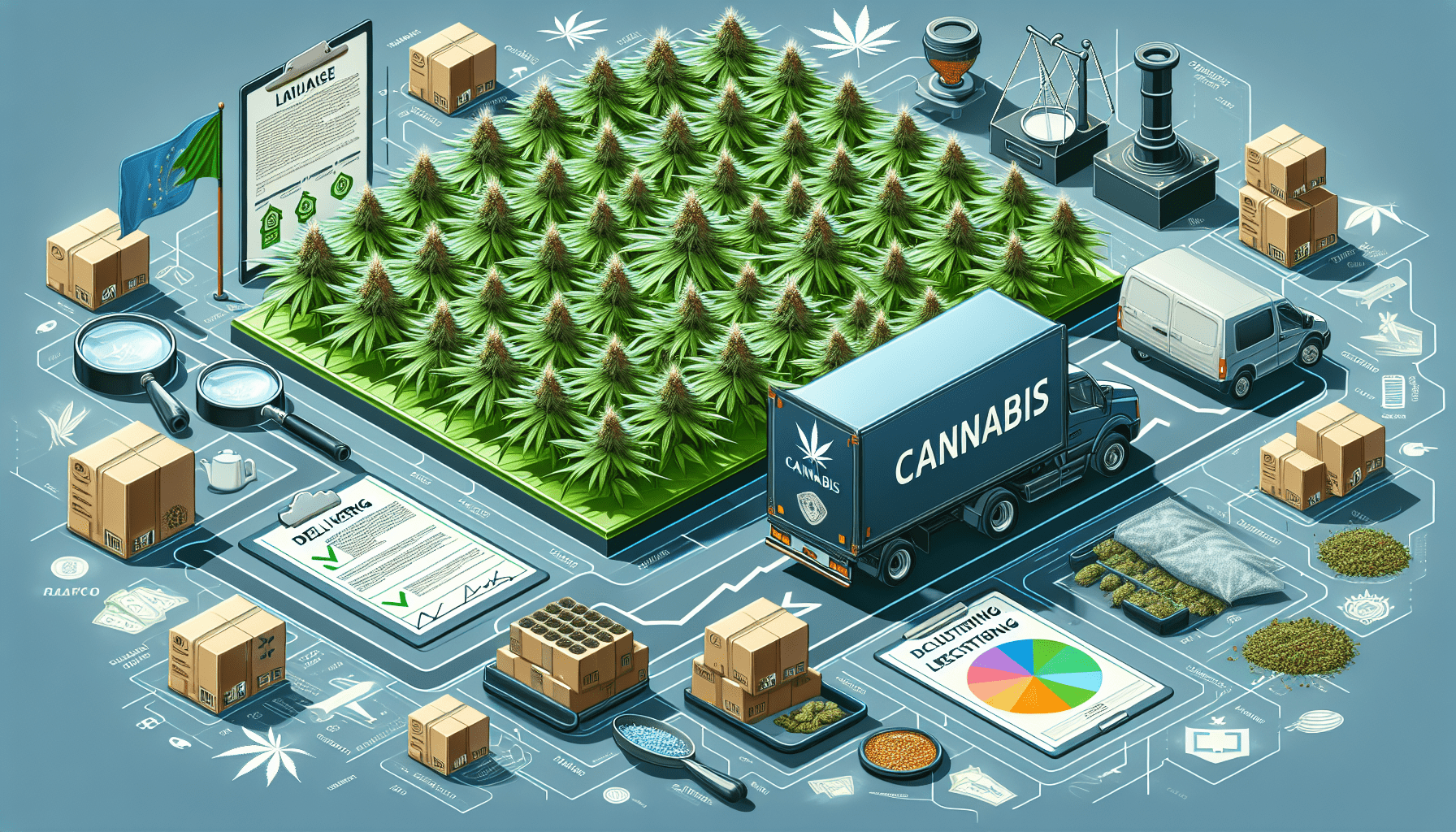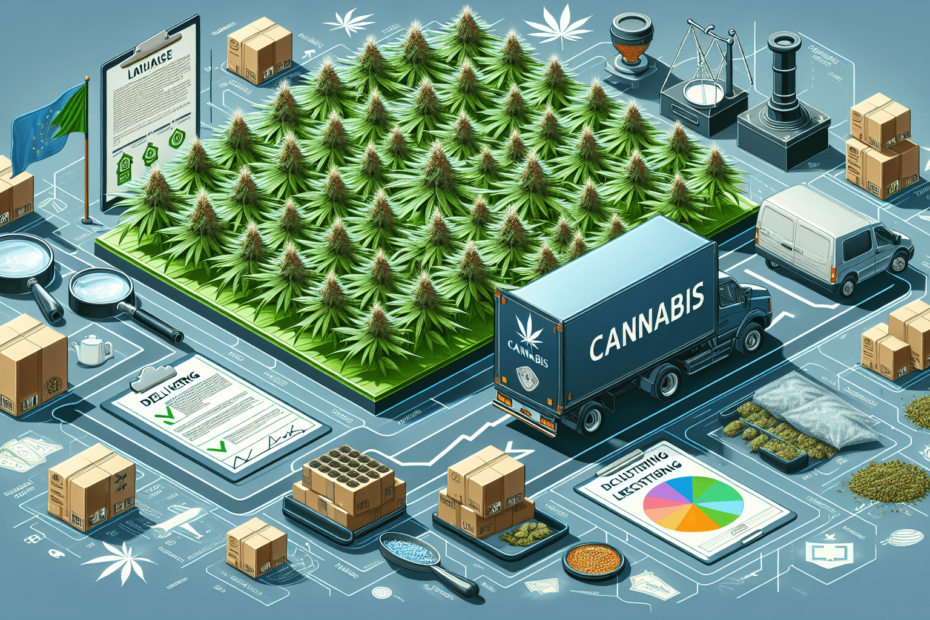So you’re curious about the regulations surrounding cannabis delivery services, huh? Well, you’ve come to the right place! In this article, we’ll be taking a closer look at the ins and outs of cannabis delivery service regulations. From understanding the legal requirements to ensuring safe and secure deliveries, we’ve got you covered. Whether you’re a cannabis enthusiast or a budding entrepreneur looking to enter the industry, this overview will provide you with valuable insights into navigating the complex world of cannabis delivery regulations. So sit back, relax, and let’s dive into the fascinating world of cannabis delivery service regulations.

Federal Regulations
The Controlled Substances Act
The Controlled Substances Act is a federal law that classifies drugs into different schedules based on their potential for abuse and medical value. Cannabis is classified as a Schedule I substance, which means it is considered to have a high potential for abuse and no accepted medical use. This classification makes cannabis federally illegal, and its possession, distribution, and use are subject to severe penalties.
The Agriculture Improvement Act of 2018
The Agriculture Improvement Act of 2018, also known as the Farm Bill, legalized the cultivation of hemp, which is defined as cannabis with less than 0.3% THC. This law removed hemp from the Controlled Substances Act and allowed for the production and sale of hemp-derived products, including CBD. However, the production and sale of marijuana, which contains higher levels of THC, remains illegal under federal law.
The Drug Enforcement Administration (DEA)
The Drug Enforcement Administration (DEA) is a federal agency responsible for enforcing the controlled substances laws and regulations in the United States. The DEA plays a significant role in regulating the production, distribution, and use of cannabis. It sets quotas for the production of marijuana for research purposes, monitors compliance with federal laws, and investigates illegal cannabis activities.
State Regulations
Legalization and Decriminalization
Many states have taken steps to legalize or decriminalize the use and possession of cannabis for recreational or medical purposes. These state laws vary widely, with some states allowing both recreational and medical cannabis use, while others only permit medical use. Legalization and decriminalization laws often dictate who can possess and use cannabis, the amount allowed for personal use, and the penalties for non-compliance.
Licensing and Permits
To operate a cannabis delivery service, individuals and businesses must obtain the necessary licenses and permits from their respective state regulatory agencies. These licenses typically include background checks, financial and operational requirements, and proof of compliance with state regulations. Licensing fees may vary depending on the state and can be a significant financial barrier for aspiring business owners.
Zoning and Location Restrictions
State regulations often include specific zoning and location requirements for cannabis delivery services. These regulations determine where dispensaries and delivery services can operate, such as the minimum distance from schools, parks, and residential areas. Zoning and location restrictions aim to minimize the potential negative impact of cannabis businesses on communities.
Security and Transportation Requirements
Due to the high value and potential risks associated with cannabis products, states impose strict security and transportation requirements on cannabis delivery services. These requirements may include surveillance systems, alarm systems, secure storage facilities, and vehicle tracking systems to ensure the safety of products and prevent unauthorized access or theft. Delivery services must also comply with specific transportation protocols, such as using tamper-evident packaging and following designated delivery routes.
Local Regulations
City and County Ordinances
In addition to state regulations, cannabis delivery services must adhere to local ordinances set by cities or counties. These ordinances may impose additional restrictions or requirements on top of state regulations. Local municipalities have the authority to set specific rules regarding licensing, zoning, operating hours, and product testing. It is essential for cannabis delivery services to familiarize themselves with both state and local regulations to ensure compliance.
Business Registration and Taxation
Like any other business, cannabis delivery services must register with the necessary local authorities and comply with taxation regulations. This includes obtaining a business license, registering for a sales tax permit, and paying applicable taxes on cannabis products. Tax rates for cannabis can vary greatly depending on the state and local jurisdiction, and failure to comply with tax regulations can result in severe penalties.
Packaging and Labeling
State and local regulations often mandate specific packaging and labeling requirements for cannabis products. These requirements aim to ensure product safety, provide accurate information to consumers, and prevent access to cannabis by minors. Packaging must be child-resistant and tamper-evident, while labels must display essential information such as potency, ingredients, warning labels, and batch numbers. Failure to comply with packaging and labeling requirements can result in fines or product recalls.
Advertising and Marketing Restrictions
Cannabis delivery services face significant restrictions when it comes to advertising and marketing their products. Most states prohibit advertising that targets minors or portrays cannabis use in a positive light. Additionally, certain advertising mediums, such as billboards or television commercials, may be off-limits for cannabis businesses. Strict regulations also apply to online advertising, including age verification processes and limitations on promotional activities. It is crucial for delivery services to develop compliant marketing strategies to avoid potential legal consequences.
Operational Restrictions
Minimum Age Requirements
To prevent cannabis access by minors, state regulations specify minimum age requirements for both employees and customers of cannabis delivery services. Employees must be of legal age to work in the cannabis industry, typically 21 years old, while customers must meet the minimum age to purchase cannabis, which can vary between states.
Delivery Hours and Limits
State regulations often dictate the hours during which cannabis delivery services can operate. These regulations aim to prevent late-night deliveries and minimize disturbances to residential areas. Additionally, there may be limits on the quantity of cannabis that can be delivered to an individual customer to prevent potential abuse or illicit distribution.
Product Restrictions and Quality Control
States impose strict regulations on the types and quality of cannabis products that can be sold and delivered. These regulations cover aspects such as THC potency limits, product testing for contaminants, and restrictions on certain cannabis-infused products. Delivery services must ensure they only offer compliant products that meet strict quality control standards.
Record-Keeping and Reporting
To ensure transparency and compliance, delivery services are required to maintain detailed records of their operations. This includes keeping track of inventory, sales, employee certifications, and customer information. Delivery services must also submit regular reports to state regulatory agencies regarding their activities, such as sales data, compliance with regulations, and any incidents or discrepancies that may have occurred.

Background Checks and Training
Background Check Process
Cannabis delivery services must conduct thorough background checks on their employees to ensure they meet the necessary requirements and are deemed suitable for the industry. These background checks typically include criminal history, financial stability, and employment verification. State regulations may specify the criteria for disqualification, such as past drug convictions or other disqualifying offenses.
Employee Training and Certification
Employees of cannabis delivery services must receive appropriate training to perform their roles safely and responsibly. This can include education on state regulations, customer service, proper product handling, responsible cannabis use, and security protocols. Some states may also require employees to obtain certifications or licenses, such as a cannabis industry badge or a food handler’s permit.
Compliance with Labor Laws
Cannabis delivery services must comply with applicable labor laws, including minimum wage requirements, overtime regulations, and workplace safety standards. Employees are entitled to fair treatment, wages, and working conditions, and delivery services must ensure they meet these obligations to avoid legal consequences and employee dissatisfaction.
Consumer Safety and Education
Age Verification
To prevent cannabis access by minors, delivery services must implement robust age verification processes. This can include requesting identification upon delivery, using electronic age verification systems, or maintaining a secure customer database that verifies the age of customers before completing a purchase. Ensuring the strict enforcement of age restrictions is vital for the responsible operation of cannabis delivery services.
Proper Packaging and Information
Delivery services must prioritize proper packaging to ensure the safety and integrity of cannabis products during transportation. Child-resistant and tamper-evident packaging is essential to prevent accidental ingestion or unauthorized access. Additionally, packaging should clearly display accurate and comprehensive product information, including dosage instructions, potential side effects, and appropriate warnings.
Lab Testing and Quality Assurance
To ensure consumer safety and product quality, state regulations require cannabis products to undergo lab testing for contaminants, potency levels, and accurate labeling. Delivery services must work with trusted laboratories to test their products and provide certificates of analysis that verify the products’ safety and compliance. Quality assurance protocols must also be in place to guarantee consistent product quality.
Education Campaigns
Cannabis delivery services play a crucial role in educating consumers about responsible cannabis use, potential health risks, and legal compliance. Utilizing online resources, brochures, or in-person consultations, delivery services can provide accurate information on topics such as dosage recommendations, potential drug interactions, and the responsible consumption of cannabis. Education campaigns can help promote a safer and more informed cannabis culture.

Taxation and Financial Regulations
Sales and Excise Taxes
Cannabis delivery services are subject to sales and excise taxes imposed by state and local governments. These taxes can vary significantly, depending on the jurisdiction, and are typically calculated based on the sale price or weight of cannabis products. Meeting tax obligations is essential for the financial sustainability of delivery services and compliance with state regulations.
Banking and Financial Services
Access to banking and financial services can be a significant challenge for cannabis delivery services due to the federal illegality of cannabis. Many financial institutions are hesitant to provide banking services to cannabis businesses due to the potential risks and legal uncertainties. Securing reliable banking partners is crucial for the management of finances, payment processing, and compliance with reporting requirements.
Reporting and Compliance
Cannabis delivery services must maintain accurate financial records and comply with reporting requirements set by state and local authorities. This may include regular tax filings, sales reports, inventory monitoring, and financial statements. Strict compliance with reporting obligations is essential to avoid penalties and maintain transparency in financial transactions.
Compliance and Enforcement
Inspections and Audits
State and local regulatory agencies may conduct inspections and audits of cannabis delivery services to ensure compliance with regulations. Inspections can focus on various aspects, such as security protocols, inventory control, employee certifications, and record-keeping practices. Delivery services must be prepared to cooperate with inspections and rectify any identified non-compliance promptly.
Enforcement Agencies
Enforcement agencies, such as the state police or local law enforcement, are responsible for enforcing cannabis regulations and investigating any suspected illegal activities. These agencies have the authority to conduct raids, seize illegal products, and arrest individuals involved in illicit cannabis operations. Delivery services must operate within the confines of the law to avoid engagement with enforcement agencies.
Penalties and Fines
Non-compliance with cannabis regulations can result in severe penalties and fines. Penalties can vary depending on the nature and severity of the violation, ranging from minor fines to the revocation of licenses and criminal charges. Delivery services must adhere to all regulations to avoid financial losses and legal repercussions.
Compliance Assistance Programs
To support cannabis businesses in their efforts to comply with regulations, some states offer compliance assistance programs. These programs provide guidance, resources, and training to help delivery services understand and meet their compliance obligations. Engaging with these programs can be beneficial for delivery services, as it demonstrates a commitment to compliance and allows for more efficient operations.

Evolution of Regulations
Changes and Amendments
Cannabis delivery service regulations are subject to changes and amendments as the cannabis industry continues to evolve. As more states legalize cannabis or make modifications to their existing regulations, delivery services must stay informed and adapt their practices accordingly. Regularly reviewing state and local regulations and seeking legal counsel can help delivery services navigate and comply with any updated requirements.
Challenges and Legal Battles
The implementation of cannabis delivery service regulations has faced various challenges and legal battles. Some opponents argue that cannabis regulations are too restrictive, while others believe they do not go far enough to protect public health and safety. Legal battles have arisen regarding issues such as licensing processes, zoning restrictions, and advertising regulations. The outcome of these challenges can significantly impact the operations and profitability of delivery services.
Industry Lobbying and Advocacy
The cannabis industry, including delivery services, engages in lobbying and advocacy efforts to influence the development and amendment of regulations. Industry associations and trade groups work to promote favorable legislation, address regulatory concerns, and ensure the fair treatment of cannabis businesses. Active participation in these efforts can help delivery services shape the regulatory landscape and advance their interests.
Future Outlook
Potential Federal Legalization
Although cannabis remains federally illegal, there is growing momentum for potential federal legalization. As more states move towards legalization, the pressure for federal reform increases. Federal legalization could provide a more consistent regulatory framework for cannabis delivery services and expand opportunities for growth and innovation in the industry.
Increased Standardization
As the cannabis industry matures, there is a growing need for increased standardization in regulations. This includes efforts to harmonize state regulations, establish uniform testing and labeling standards, and streamline licensing processes. Standardization can support consumer safety, promote fair competition, and enable the responsible growth of cannabis delivery services across different jurisdictions.
International Regulations and Harmonization
As cannabis legalization spreads globally, international regulations and harmonization efforts will become increasingly important. Countries with legal cannabis markets will need to collaborate on issues such as import/export regulations, quality control standards, and cross-border transportation protocols. Harmonization can facilitate international trade and create a more cohesive global cannabis market.
In conclusion, cannabis delivery service regulations encompass a wide range of federal, state, and local requirements. From federal laws such as the Controlled Substances Act to state-specific licensing, safety, and taxation regulations, delivery services must navigate a complex web of rules to operate legally. It is essential for delivery services to understand and comply with these regulations to ensure the safety of consumers, maintain transparency, and contribute to the responsible growth of the cannabis industry. With the potential for future legalization and increased standardization, delivery services must stay informed and adapt to the ever-evolving regulatory landscape.

